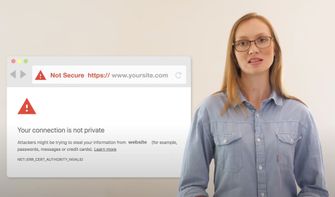A shift in the certificate industry is approaching that will reshape how organisations handle client authentication and mutual TLS implementations. Starting in 2025, major Certificate Authorities will stop issuing public TLS certificates with the …
Global No.1 SSL Certificate and Website Security Provider

Website security is an integral part of protecting your website as well as the people who visit it. You need to have the right security setup so your customers can browse, shop, and return with total confidence.
SSLTrust provides SSL Certificates to help encrypt, secure, and enhance customer trust. We have well-established partnerships with leading Authorities, including DigiCert, GeoTrust and Sectigo. At SSLTrust, we bring you today’s leading SSL products and solutions at fantastic prices.

SSL Certificates
Secure your domain quickly, efficiently and at a low price. A Single Domain SSL Certificate is specifically designed to protect one domain only, meaning it cannot be used for subdomains or different domains.
Lowest Price
$
Per Year
Wildcard SSL Certificates
Secure your domain name along with unlimited sub-domains. For example, you can secure your main domain (example.com) and all subdomain variants (store.example.com, blog.example.com, etc.)
Lowest Price
$
Per Year
Business SSL Certificates
Provide the ultimate seal of trust with Organisation Validation (OV & EV) SSL Certificates that require validation of your business entity. Your customers will see you as a verified registered business.
Lowest Price
$
Per Year
Multi-Domain Certificates
Conveniently secure multiple domains or IPs with a single Multi-Domain SSL Certificate.
Lowest Price
$
Per Year
Code Signing
Secure your software and code so users can download your executables without being deterred by “unknown developer” warning messages.
Lowest Price
$
Per Year
Email (S/MIME)
Encrypt and sign your emails or documents and verify your identity, ensuring secure email correspondence.
Lowest Price
$
Per Year
Each SSL Certificate at SSLTrust now comes with an optional free Malware Scanning & Monitoring addon.
From Configuration to Securing
Everything you need from an SSL Provider
We strive to deliver complete solutions at favourable prices, simplifying your choices and providing all the necessary resources in one accessible location.
Cost-Effective Security
We are dedicated to providing affordable security without sacrificing quality. Thanks to our strong industry partnerships and the advantage of bulk buying, we can offer competitive pricing on all our Digital Certificates.
30-Day Refund Policy
To ensure your satisfaction, every SSL/TLS Certificate comes with a 30-day cancellation and refund policy, giving you complete peace of mind.
Dedicated Global & Global Support
We aim to provide quick and convenient security solutions that are perfect for your needs. Whether you need help online, onsite, or remotely, our dedicated support team is always ready to assist you.
Streamlined Management Platform
Our intuitive platform simplifies managing your certificates, allowing you to configure, oversee, and update everything from one centralised location.
We Pride Ourselves on Customer Satisfaction
When customers come to us for their SSL Certificates, we do more than sell them. We provide a complete solution to help you configure, manage and install your SSL Certificates. This is shown in the feedback we receive from our valued customers.
5 out of 5 stars
5 out of 5 stars
5 out of 5 stars
5 out of 5 stars
SSLTrust Cyber Security Blog
What's New from our Blog and Help Guides...
Mark your calendars. Starting in 2029, SSL/TLS certificates will have a maximum lifespan of just 47 days. This move by the CA/Browser Forum is a huge step toward better digital security.
Since its release in 2002, OpenVPN has become the world's most trusted open-source protocol for secure remote access, with its official client boasting over 50 million downloads. Its proliferation is driven by the global shift to remote work, with …
SpinupWP has emerged as a premier, developer-focused hosting control panel, transforming WordPress management with its Git-integrated deployments and performance-driven automation. Central to its secure, modern infrastructure is the implementation …










